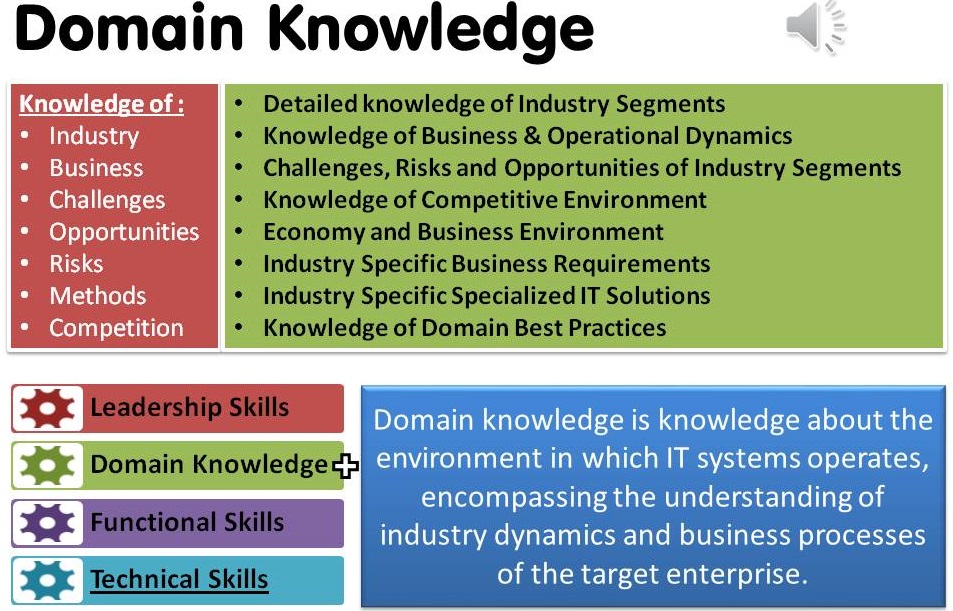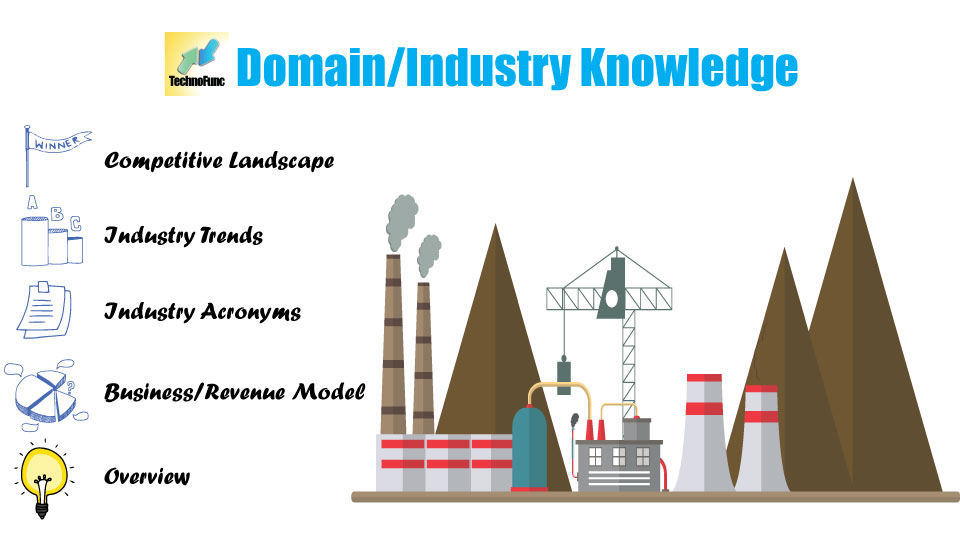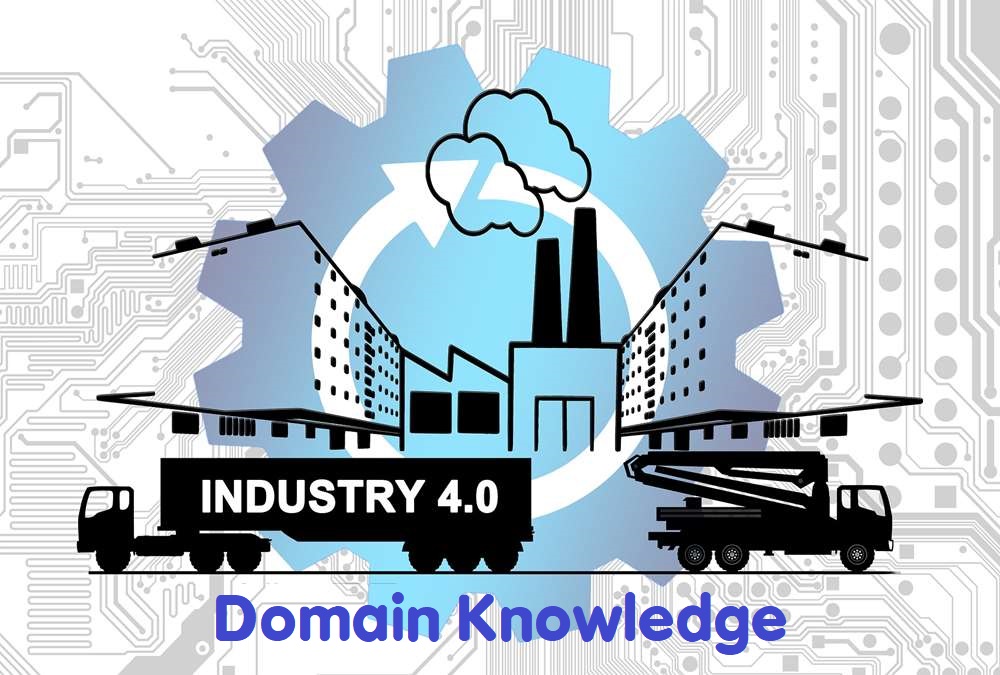- Home
- Business Processes
- Industry Knowledge
- Aerospace Industry
- Automotive Industry
- Banking Domain
- BFSI Industry
- Consumer/ FMCG Industry
- Chemicals Industry
- Engineering & Construction
- Energy Industry
- Education Domain
- Finance Domain
- Hospitality Domain
- Healthcare Industry
- Insurance Domain
- Retail Industry
- Travel and Tourism Domain
- Telecom Industry
- Leadership Skills
- eLearning
- Home
- Leadership Skills
- Career Management
- Building Your Domain Knowledge
Building Your Domain Knowledge
Domain knowledge from a career management perspective encompasses the understanding of industry dynamics and business processes of the target operational area. Domain expert exhibits clear knowledge in the respective industry and understands the industry concepts in general. It is always recommended to best highlight your exposure of domain in your resume or cover letter. TechnoFunc provides you with the best tutorials to gain domain knowledge in a large number of industries and business areas.
One of the problems with expertise is that people have it in some domains and not in others.
- Daniel Kahneman
What is Domain?
Have you ever been asked this question in an interview – What is the domain in which you are working?
As per the dictionary definition of the domain, it is an area of territory owned or controlled by a particular ruler or government. In computing terms, a domain represents a distinct subset of the network with addresses sharing a common suffix or under the control of a particular organization or individual. A domain contains a group of computers that can be accessed and administered with a common set of rules. In the context of career management as the domain will refer to a specific, specialized discipline or field for example banking domain or insurance domain or software domain, or ERP Domain.
What do we mean by Domain Knowledge?
Domain knowledge is knowledge about the environment in which any organizational system operates. From a career management perspective, it encompasses the understanding of industry dynamics and business processes of the target operational area. For the software developer and tester, domain Knowledge is the knowledge of the environment affecting IT systems decisions and implementation environments. For a person interested in becoming a domain expert, it is the knowledge of a specific, specialized discipline or field like banking or travel industry which use different terminologies, have different processes and metrics and operational mechanisms. People who have domain knowledge, are often considered specialists or experts in the field.
In contrast to general knowledge, it is very specific knowledge that can be applied in a particular context. This knowledge includes business model, business terminology, competitive landscape, domain-specific processes, domain-specific procedures and policies, user workflows, data pipelines. Operations on domain knowledge are performed by meta-knowledge.
Domain knowledge is the knowledge about the environment in which the business organizations operate, and a domain expert exhibits clear knowledge in the respective industry and understands the industry concepts in general.
What is a Domain-Independent Knowledge?
Domain independent knowledge is a term mostly used for a more general discipline, as, for example, knowledge of programming, or knowledge of change management skills or project management skills will be applicable to all industries with minimum variations. Whereas the business models for these industries will be entirely different.
Domain Knowledge for Software Developer & Tester
In software engineering, domain knowledge is knowledge about the environment in which the target system operates. Software developers usually learn this knowledge from the software users in the domain who are also called domain specialists, domain experts, or subject matter experts.
The major difference between a novice and a person with domain knowledge is the value that the expert brings in. A novice software developer or tester can get the job done but a domain expert can add value to the entire process by making suggestions around bringing effectiveness, efficiency, or operational excellence to the process.
A tester or developer who has a good understanding of the core functionality of the software being deployed and has a good understanding of how the business operates can easily understand and interpret the requirements, provide feedback or suggestions for improvements, and guide the team on important decisions and help create innovative and sustainable solutions that can drive outcomes for the business.
What is the difference between functional knowledge & domain knowledge?
Generally, people think that functional knowledge and domain knowledge is the same. As explained before, Domain knowledge is the knowledge about the environment in which any organizational system operates. Domain Knowledge is the knowledge of a particular industry. Domain knowledge encompasses an understanding of the industry dynamics, history, sectors and segments, business model, competitive landscape, value chain, customers, supply chain, challenges, and the industry-specific strategies of the target enterprise. From a career management perspective, it encompasses the understanding of industry dynamics and business processes of the target operational area.
Functional knowledge is the knowledge of a particular function like human resources, accounting, finance, etc. Functional knowledge provides keenness and quickness in understanding and dealing with a business situation in a manner that is likely to lead to a good outcome. The term "business acumen" is the knowledge and understanding of the financial, accounting, marketing, and operational functions of an organization. The same knowledge can be included in different domains like logic and mathematics
An expert is one who knows more and more about less and less.
- Nicholas Murray Butler

Domain Knowledge in Resume
Mention of relevant domain skills in your resume can help build your credentials and help you with exploring your dream job. It is always recommended to best highlight your exposure of domain in your resume or cover letter. Many employers today while passing instructions to their talent management teams demand specifically to target candidates who have exposure in a particular industry domain. Also when you get the opportunity to work for a new industry try to go deep to understand the business model and keep improving your domain knowledge along with your technical or functional skills.
What is the importance of domain knowledge?
Talent managers and hiring managers to recognize that to be successful in today’s competitive world we need to invariably develop domain knowledge, either in a new industry, such as health or insurance, or a new business function, such as marketing or supply chain management.
Domain knowledge is the knowledge of Industry and Business. Most domains have industry-specific best practices and variance. Gaining business acumen and domain expertise provides the ability to make good judgments and quick decisions and empower the executives to deal with complex business situations. Gaining an understanding of the industry means a more thoughtful analysis, clearer logic underlying business decisions, closer attention to key dimensions of implementation and operation, and more disciplined performance management.
Communicating between end-users and software developers is often difficult. They must find a common language to communicate in. Developing enough shared vocabulary to communicate can often take a while. Good domain knowledge will equip you with the understanding of the key challenges and risks and opportunities; faced by the industry in general and business in particular. It will provide you an understanding of specific methods applicable to business and also the knowledge about the competition and their advantages.
We as professionals work for these enterprises and provide various solutions that need to be tailored to the unique demands of the target industry and its dynamics. For our solutions to be sustainable and effective they must be designed keeping in view the present and future dynamics of the industry and that can be achieved only by having a domain and business understanding of the particular industry/business.
What is meant by Domain Excellence?
Given below are the attributes of a professional who has gained domain excellence in the area:
1. Business Orientation:
- Shows clear interest in the respective industry and understands the industry concepts in general
- Supports and follows the developments in the respective industry (e.g. business update, press)
2. Risk Awareness
- Understands the relevance of risk minimization and the importance of risk management
- Shows clear awareness of business risks reflecting on own behavior
- Is acting risk-aware
3. Compliance
- Is aware of the seriousness in compliance with regulations and formalities
- Shows clear awareness and acts as a role model for compliance
How to learn Domain Knowledge?
Domain knowledge is a detailed understanding of a particular process, activity, or industry and used to describe the knowledge of experts in a particular area. Lack of experience in the domain might get in the way of you meeting your career objectives and growth. To gain expertise on a particular domain one should focus on:
- Gaining detailed knowledge of Industry Segments
- Gaining knowledge of Business & Operational Dynamics
- Understanding Challenges, Risks, and Opportunities of Industry Segments
- Gaining knowledge of Competitive Environment
- Keeping yourself in touch with the Economy and Business Environment
- Understanding the industry Specific business requirements
- Knowledge of Industry Specific Specialized IT Solutions and offerings in the marketplace
- Knowledge of domain best practices
Building Domain Expertise
Domain expertise is the knowledge and understanding of the essential aspects of a specific area of business. Each industry is different when it comes to their way of business; hence they require folks with a skill set that can bring both technical and a business perspective.
As an example, if one is working for the healthcare industry, before working on the solution he should be aware of the healthcare terminology like inpatient, outpatient, types of different hospitals, the business models of various healthcare providers, etc.
Essentially to be a domain expert, one should build a good understanding of the input and output, and the operational business model of the industry and how it generates value for its customers. A good Domain Expert will have an in-depth understanding of the industry processes, its products and features, and the ability to propose a solution understanding and articulating its unique challenges and business requirements.
How TechnoFunc helps?
We have several courses spanning multiple industries that provide you with an overview of various industries, their operational dynamics, and their unique challenges. TechnoFunc provides you with the best tutorials (made of articles and videos) to gain domain knowledge and business acumen in a large number of industries/businesses. Browse industry-specific tutorials by clicking on the image for the industry of your interest.
When you want to do your career planning and as part of the same want to move to a different domain you may feel incompetent or overwhelmed with the idea of changing industry or business domain.
Rather than going through an effort-intensive process of trying to seek advice and input from a variety of sources, and thereby getting the required exposure, we recommend you go through the following articles and tutorials specific to your domain which will expose you to terminology, business model, data points and diverging ideas which have been compiled by domain experts from the individual industry that will open many more new professional possibilities for you.
As you start a new project, whether you’re already familiar with or new to a business domain, make a point to explore these articles by TechnoFunc to gain different perspectives on the problem you’re trying to solve. Taking this approach will help you look at situations more holistically and examine issues from all perspectives, which in turn yields ideas for more creative outcomes. As you gain more industry or business domain expertise, you’ll find yourself making larger contributions to your project.
Explore Our Domain / Industry Tutorials:
- Aerospace Domain
- Automotive Domain
- Banking Domain
- BFSI Domain
- Consumer / FMCG Domain
- Chemicals Domain
- Engineering and Construction Domain
- Energy Domain
- Education Domain
- Financial Management & Business Dynamics
- Global Markets Domain
- Hospitality and Leisure Domain
- Healthcare Domain
- Insurance Domain
- Technology Domain
- Retail Domain
- Travel Domain
- Telecom Domain

Outside of their particular area of expertise scientists are just as dumb as the next person.
- Richard P. Feynman
Domain Knowledge Questions
Many companies today want to assess their candidates on domain expertise. Most of the modern job-profiles demand more specialized skill sets and employees want to assess their potential candidates on functional skills and domain capabilities. TechnoFunc has created domain-based assessments to help organizations measure a wide variety of industry skills and help students take domain knowledge tests and gain certifications. This helps candidates to do a self-assessment for evaluating themselves for a particular domain or a functional process area. Recruiters can evaluate the expertise of job seekers with the expert-curated questions provided in these domain-based assessments. The questions are presented in the form of multiple-choice and multiple answers. These TechnoFunc Domain Tests can also be used in employee development to facilitate the up-skilling of employees. The test results provide clarity on the areas that need improvement, which helps to create personalized training programs for workforce development as per industry standards.
Related Links
You May Also Like
-
In our present Hitech scenario, society is changing very fast. What are the skills that are most relevant for leaders in relation to the changing economic environment? Leaders need to develop skills to drive innovation and change in order to play a more central role in their organizations’ activities. How do managers accept the change and meet business expectations by becoming a key figure in driving change and innovation?
-
A good leadership style is something that every effective leader must have in order to succeed, but identifying what that entails or does not entails might be difficult to understand. Most of the research on leadership focuses on the exemplary, best practices, and positive attributes of effective and successful leaders. This article talks about a new approach to learn leadership using lessons from bad leadership. That is the lessons to be learned by examining leaders who have not effectively exercised their power, authority, or influence.
-
Improving Skills & Competencies
Whenever you are looking for a job or having your yearend discussion with your manager, two terms generally referred to be “Skills” and “competencies”. Today success in a career is an outcome of having essential competencies and building required skills. Skills could be a major distinguishing factor for you to move up on the career ladder and jump from one role to another. Leadership skills when combined with relevant domain and functional expertise can transform your entire career growth and help you have a fulfilling career.
-
Stress is an essential part of our life. No one can live without stress. Stress can be beneficial as well as harmful. Stress as a positive influence adds excitement and hope while as a negative influence it can result in destructive feelings, anger, and depression. Although the general orientation to stress is to consider unfavorable outcomes, yet one must have observed that stress experiences may also facilitate the development of effective and varied coping behavior, increased personal resources, and lead to a sense of competence in development. Stress at a moderate level is not only inevitable but may be useful for physical and mental well-being.
-
Functional skills are the core competencies that can be transferred to different work areas like understanding of finance is independent and a finance expert can comfortably adapt to a manufacturing or service industry. Functional skills are obtained by understanding the various processes and the principles applicable to a business function. Functional experts are in great demand as they are specialists and required to manage the business processes like human resources, operations, or finance.
-
Emergent leadership occurs when a group member is not appointed or elected as leader, but rather that person steps up as the leader over time within-group interactions. Have you ever faced challenges in getting accepted into your new role of position as a leader? Groups don't automatically accept a new "boss" as a leader. Emergent leadership is what you must do when taking over a new group. Learn more about emergent leadership.
-
The best career choices are ones that match your values. Each person has several values that are important to him. These values are highly personal and knowing them provides a clearer sense of what's most important to you in your life and career. Career values are the beliefs you consider important from a work standpoint. Values help you understand what you want from a job? Explore a few examples of work values that can influence career path and job satisfaction.
-
Time management is the process of planning and exercising conscious control of time spent on specific activities, especially to increase effectiveness, efficiency, and productivity. The best time management techniques improve the ways you work. Time management refers to managing time effectively so that the right time is allocated to the right activity. Learn more about the five steps for effective time management viz. study, identify, analyze, decide, and implement.
-
Team Development by Building Trust
As your team begins to work together, you need to establish a way each team member can exchange ideas and build mutual trust. Successful groups are built on trust and collaboration. A free exchange of ideas, in an open environment, will allow your team to get to know each other and enable you to check on how they work together. Learn some tips to help build team trust and establish personal bonds.
-
Understanding Corporate Strategy
Management outlook and procedures have been revolutionized by more and more innovations over the recent years. It is no longer possible to follow traditional approaches to develop your organization's direction, its management as well its effectiveness. Senior managers need to be good decision-makers. In this section, we introduce concepts for strategy, strategic planning, strategic leadership, their exact meaning and associated terms, and how to use them.
Explore Our Free Training Articles or
Sign Up to Start With Our eLearning Courses

About Us
Learning
© 2023 TechnoFunc, All Rights Reserved










